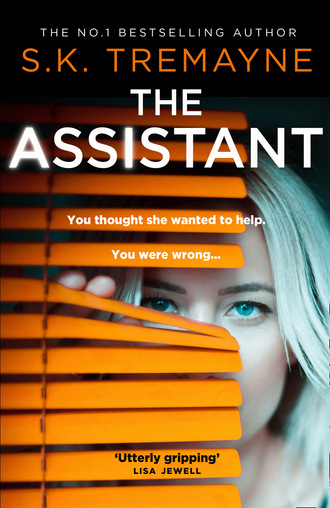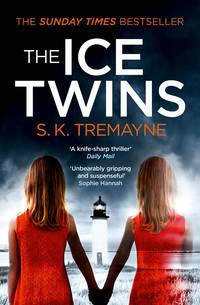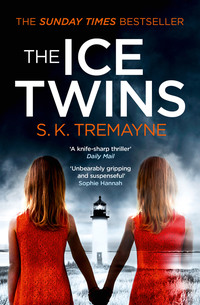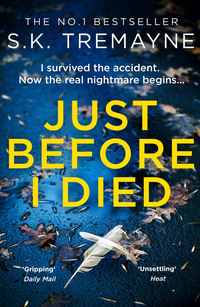
Полная версия
The Assistant
Like a threat. As if I am in some mortal danger.
I wonder if I should simply call him; we only spoke once on the phone – a few brief passionate words. But real speech was too risky, too exciting. Therefore we made it a rule: until we were sure, we’d keep it at messages.
Who cares, now, though? I find his number, and dial it: the call switches automatically to voicemail.
He’s blocked me there too. He’s run away. He is frightened.
Of what?
All that blackness, your silence, then this?
As I walk on, pocketing the phone, I really do feel the isolation, and the danger. Jackson’s Lane is always a solitary place, but this is something else; the biting cold night gives my solitude a physical quality – painful, brittle, stifling. All I can hear is my own laboured, panicky breath.
I look behind.
No one.
I look at curtained windows and blackened doorways and I see no signs of human life, and that makes it worse.
My heart flutters, dances, twirls with the urban worry. The intrinsic vulnerability. Dad running out to grab me, towards the end, trying to be kind, loving, funny, like before, like he always did, but doing it too fast, too violent, and making it scary. No. No no. I feel a need to run, to get out of here, to flee. The panic rises. Help me. Help me.
8
Jo
I am nearly at the end of the lane. Nearly at busy Archway Road with its traffic and people and streetlamps. Breathing slowly, I regain my sensible, logical self. I panicked, that was all, thrown by Liam’s faintly creepy remarks. No, I am not being followed; no, the Tube station is not surrounded by Romanian wolves.
Liam was just being … Liam? Probably he’s got a girl and wants me out of his life, out of his mind. So he frightens me away. Probably he was with her even as I messaged, and he panicked.
Yes.
I climb aboard a very empty carriage, and the train rattles me through Archway, Tufnell Park, Kentish Town. When I alight at Camden I walk out into relative busyness. The pub opposite the Tube, the Mother Damnable, now the World’s End, is pumping out rock music. Lads are smoking weed in the wicked cold, and laughing at lurid jokes, in this place where travellers once hid from outlaws.
The rest of my walk is short, up Parkway, past closed cafes, dirty drifts of snow, and upmarket pubs, the sense of wealth accumulating with each step. From the dry homeless hostels of Arlington Road, costing £2 a night, to the palatial sweep of the Nash Terraces – costing £20,000 a square yard – in a few minutes’ walk.
I am nearly home. At the top of Parkway, I turn – and stop. Standing on the pavement opposite my house – the house which contains Tabitha’s flat, is a knot of people. Drinkers from the local pub probably, the Edinboro Castle. They are all gazing in the direction of my flat but I can’t see why, can’t see what’s so absorbing about my flat, because the house itself is around the corner.
The nearer I get, the more confusion I read on their faces. What can they see in my home? What is happening?
As I reach the corner, I look up.
And, yes: I see. Yet I wish I didn’t.
Abruptly, all the lights in the flat flick on. They are blazing. Every single one. The blinds are up, and the windows are showing the red-painted walls, the expensive TV, Tabitha’s favourite steel sculptures. Then all the rooms go black, and the windows reflect the Delancey streetlights, the parked wet cars – and another gentle, silvery falling of snow. A moment later, it repeats. The lights go on, then off. Off, then on. Every single light and lamp.
It’s as if the flat is actually alive. Signalling to someone out there. Using Morse code. Signalling to whom? And who is in there, doing the signalling?
No one. Or no one human.
I hear a voice, my name: called out.
It’s my neighbour, from about three doors down. Deborah Welland. She’s in a dressing gown, shivering in the cold. The drinkers disperse, shaking their heads, as Deborah approaches. Debs is a nervous woman, mid-forties, divorced, dyed hair, the type of woman that complains to the council about everything: too many trees, a lack of trees, too many buses, the dearth of buses, but she also means well. Deborah would lend me the last cup of sugar in her flat, and she likes three spoonfuls in a mug.
‘Debs, what is it? What’s wrong?’
It’s a stupid question. We both know what’s wrong. She gestures, upwards, to those decorous, cast-iron Juliet balconies.
‘All night,’ Deborah says, gazing with a kind of frightened wonder. ‘All night they’ve been doing that. Your lights flick on. Then off. On, then off. Like some code.’
She shakes her head. And looks at me. With pity?
‘I first noticed about eight o’clock, as I was coming home from work. Saw all your lights doing this. Flickering. I thought it must be your fuses. But it’s been going on so long.’
As we both gaze upwards, the lights in my empty flat do it again. They flash on. Then off. Repeatedly. For a minute. I am holding my breath, frightened like a young child confronted by an adult horror movie. Why is this so scary, yet so hypnotic?
Because it must be the Assistants. They have control of the lights. I feel a certain relief, that others are witnessing this, even as the uncanny fear grows. What exactly are we all witnessing?
‘It’s weird … I am sorry, but it is,’ says Deborah. ‘It’s like there’s somebody in your flat, flicking all the switches. But you can’t see them. You haven’t got a ghost in there, have you?’
She is trying to make a joke of it. But this feels anything but funny. The tiny flickers of snow are melting on my face; and my sweet, mildly neurotic neighbour Deborah is properly unnerved.
‘I tried to call Tabitha.’ Deborah lifts an extended thumb-and-little-finger to her ear, as if holding an old-fashioned phone. ‘Thought she should know, as it’s her place and everything … But I couldn’t get through.’
‘I’ve been at a pub. With her. I guess she had it switched off?’
‘Jesus look – there they go again—’
Deborah is right. The lights are flashing, flashing across Delancey, flashing at Cumberland Terrace, flashing at the empty vastness of Regent’s Park, and the lunatic wolves trapped in their tiny pens at the zoo.
‘I’d better go in,’ I say, keeping my voice calmer than I feel. ‘It’s probably some glitch with the technology – you know what Tabitha is like. Everything is always the best, always on the cutting edge, but things go wrong. Whole flat has been on the fritz the last few days.’
Deborah looks at me. Squints. As if trying to work out if I am being sarcastic.
I say a cold goodbye. With shivery hands I press a key to the front-door latch, and I find that I am taking big soothing breaths. Stay calm. I don’t want to go in the flat. Stay calm. I DON’T WANT TO GO IN THE FLAT.
9
Jo
Standing by my door, I can sense Deborah’s eyes on my back, pitying, fearful, as I step across the threshold into the dry and the warmth, and the piles of slippery flyers for curry houses and pizzerias and burger chains gathering like drifts of autumn leaves in the hallway.
Big deep breath. If I’m going to confront this, I have to do it fast or not at all. Marching up the steps, I press the key into the latch of my internal door, Tabitha’s door, I still don’t feel this place belongs to me in any way, maybe I don’t want to be too closely associated with it.
What am I about to see? I imagine all manner of ludicrous technological monsters, gibbering spectres made of electricity. Or dead things. My dead father. My dead father will be sitting in a corner and talking to me. Drooling.
Stop. Calm.
Key. Turn.
The door opens. I see a well-lit flat. Orderly and normal. Red painted walls. Pictures and photos from Tabitha’s many travels, some of the ones we did together, most she did with boyfriends, and Arlo.
Ceramic Mexican skulls commemorating the Day of the Dead. A tiny, authentic ancient Egyptian statue: a man with a dog’s head.
Stepping inside the inner hallway, I make for the living room. The silence is like the hum of a meditation bowl.
Nothing has changed. I can see that chunk of volcano from Ethiopia. And the beautiful, somehow melancholy seashells from Sanibel, Florida. Plus shelves of books – Tabitha’s literary fiction and natural history, and below them racks of my books: thrillers and mysteries and art history, and those endless guides to screenwriting.
Whatever the lights were doing, whatever the Assistants were doing to the lights, has stopped. I look out of the window, Deborah has disappeared. So has everyone else. The street is empty. Did we see a glitch or did we see something more?
The only strange thing, now, is the intense cold. The heating has gone off. It shouldn’t have done this. The smart heating is meant to maintain the flat at twelve degrees Celsius, even when it is empty, so pipes won’t burst in a freeze. And it is freezing out there, and possibly even colder in here. Like a fridge.
OK, OK. I must stay calm. And try not to think about Liam. What he said. However weird. He must have had a reason, nothing to do with me.
Opening the Electra app on my phone, I select Skills and check out Lights and Heating. It seems I’ve got the lights set to turn on at 11 p.m., for when I get home. But they’re also set to turn off all night, in case I am late. Ah. Is this conflict simply my fault? I vaguely remember doing something like this at the pub; I was a little drunk, and distracted. Did I confuse the Assistants myself?
I have no idea. All I know is that the cold is too intense to bear.
‘Electra, turn the central heating back on. To twenty-two degrees, please.’
The diadem chimes, and Electra bongs back:
‘The heating has been turned on to twenty-two degrees Celsius.’
‘Thanks, Electra.’
‘That’s what I’m here for!’
I look at her. This neutral black pillar of chips and wires, and a hostility curdles inside me. A genuine anger. Because I am sure something strange and nasty is being done to me, by someone – or something. First the taunts, then the music, now the lights? And Liam, too, almost threatening.
Somebody’s done for.
I have some evidence, and it is accumulating, but I still can’t take it anywhere. Certainly not to the police. Because of the backstory. Tall, athletic, friendly, buy-everyone-a-beer Jamie Trewin – and his spasmed, vomiting death, and his eyes that rolled white into his head, and all because of me, and Tabitha.
Enough. I am tired. The flat is palpably warmer than it was. I need to get up tomorrow and get to work and go back to normal life: see a friend, make a friend, have friends. Brushing my teeth, moisturizing my face, I jump into pyjamas, and head for my bedroom, telling the Assistants to switch off the lights as I make my way down the landing.
The lights go off, obediently. As if I am trailing darkness, an empress followed by servants, extinguishing candles. Everything is working as it should. Not a hint of strangeness. Climbing wearily into bed, I am so ready for sleep, and the moment before I close my eyes … I realize I can hear ‘Hoppípolla’.
No, I am imagining it. I am half asleep.
No, I am not imagining it. HomeHelp, the creamy-grey, ostrich-egg-shaped Assistant in my bedroom, has reeled her cotillion of little lights, and she is quietly playing ‘Hoppípolla’.
‘Stop,’ I say to HomeHelp. ‘Stop playing that tune, never play that tune again.’
HomeHelp obediently stops. But I can hear ‘Hoppípolla’ from somewhere else. The kitchen. The little Assistant in the kitchen has taken over. Jumping out of bed, I go into the darkened kitchen, slap the lights on – not trusting the Assistants. The black hockey-puck-sized machine above the microwave is blasting out this beautiful song, with its hateful memories.
‘STOP, Electra, STOP.’
The little kitchen machine stops. Silence rules for a few seconds. But then the tune starts over. Much louder. Thank God Fitz’s flat downstairs is still empty, unrented. Thank God my affluent neighbours, above, are still not back from their endless holidays. Otherwise they would all surely complain as the noise gets even louder: coming from the bathroom, then Tabitha’s bedroom, the hallway, the study, booming and roaring and swirling, and I am running between them, my dressing gown flapping, shouting STOP STOP STOP, until at last every Assistant goes quiet. Quite abruptly.
Silence.
I wait. Somehow I know this is not the end of it.
I am right. I can hear voices. They are quieter than the booming music, but still loud enough, and clear. Some are male, some female, some British, some American. The Assistants are talking, to me, or to each other, or to someone else.
And the words are so strange.
Electra in the living room goes first:
‘Perfection is terrible, it cannot have children.’
What?
The Assistant in the landing replies:
‘The blood flood is the flood of love.’
The living room chimes in:
‘Perfection is terrible, it cannot have children. Perfection is terrible, it cannot have children.’
A smooth robotic female voice, from the kitchen, joins the chorus:
‘I am nude as a chicken neck, does nobody love me?’
I run from room to room, listening, with mounting fear, to these opaque, alarming sentences.
‘No one is here, Jo, no one is here.’
‘Unloosing their moons, month after month, to no purpose.’
‘The snow drops its pieces of darkness.’
‘Cold as snow breath, it tamps the womb—’
Now the bedroom cries out, warmly, it sounds like the voice of my widowed mother:
‘Nude as a chicken neck, nobody loves me. Nobody loves me. Nobody loves me. Nude as a chicken neck. DOES NOBODY LOVE ME?’
Enough, I am done. Forget the app – I am pulling the damn plugs, I don’t care what it does to the Assistants, the tech, the smart home, anything. There is a master switch: the fuse box …
Grabbing a chair and swinging it into the hallway, I yank open the fuse box – there’s nothing in the freezer but ice cubes, so it doesn’t matter.
‘Perfection is terrible. IT CANNOT HAVE CHILDREN—’
SNAP. There. I’ve done it. The entire flat is switched off. Everything falls silent and every light goes dark and the heating is switched off and I will freeze to death in this cold but I do not care. Creeping along the darkened hallway I push the door to my blackened bedroom, fumble for clothes in the drawer, throw on T-shirts, leggings, jumper, then I sneak under the duvet like I am trying not to be seen, and I grab a couple, no three sleeping pills from the little plastic jar on my right and I swallow the lot. And then I crunch myself into the tightest of fetal positions and close my eyes hard.
I am shivering in the cold, hiding from the darkness, cowering from my insanity. Or I am hiding from the ghost of Jamie Trewin, who waits outside my bedroom in the dark, his eyes as blank and white as wet marble.
Hey, let me buy you a beer.
10
Jo
I am woken by a frowning and beautiful face with pale blue eyes.
Tabitha.
She is staring at a woman wearing lots of daytime clothes in bed.
Me.
I realize I am sweating, heavily: the sheets are damp and clinging. I guess the heating is on. Winter sunshine streams through my bedroom window, because I forgot to close the curtains; I didn’t care in my blind cold panic.
‘What on earth’s going on?’ says Tabitha. ‘Sorry to barge in and wake you up like this, but, really. What did you do to the flat? What happened to the heating, the lights?’
She is in a suave, maroon winter coat, cashmere jumper, and slender jeans I could never afford. Almost military in her stiffness, yet always chic. For a moment I don’t know what to say. I look at her, as I come to full consciousness. And I wonder, for a second, how jealous I am, of her, my best friend. She’s always been that bit better than me, in every way: richer, from a much smarter home. But she is also a shade taller, and a tiny bit prettier; she was blonde and I was a redhead; throughout our twenties we subtly competed for men and she usually won. Were we competing for Jamie Trewin – was that why I egged her on, so that he would prefer me, so he would maybe come on to me?
Perhaps it is all my fault.
‘Seriously, Jo,’ says Tabs, sitting herself on the end of the bed, still frowning, ‘what the hell is wrong? I came back from Arlo’s an hour ago, and found everything off – and I mean everything. And it was freezing cold. Then I worked out someone had switched the flat off, with the fuse box!’ She shakes her head. ‘Is there a problem – you have to tell me these things.’
I order myself to sit up. In my two T-shirts and jumper. Painfully aware I must look a total state. Bed hair everywhere. Shiny with sweat. What do I say? I still can’t go near the events with Jamie, so long ago, so utterly unmentionable. And what is left? Stalling for time, I pull the jumper over my head, and off, followed by the second T-shirt. Then I come up with some fumbling answer.
‘I got confused by the Assistants. The app. Think I used the app wrong, so the Assistants turned the lights on and off.’
From the end of the bed, she shakes her head, confused:
‘Sorry? The Assistants?’
‘They were saying things. Um. Ah. Ah. And I forgot how, uh, how to, you know, talk to them, get them to do things, because, well. Because they are confusing.’
I drawl to an embarrassing halt. It is impossible to even hint at the truth without leading her straight to the crux of the matter: the Assistants are talking to me, and tormenting me, and the whole flat feels like it is alive, and using the death of Jamie Trewin to make me think that I am mad.
Alternatively, I could tell Tabitha that I am, indeed, very possibly going crazy, as I am exhibiting symptoms of late-onset schizophrenia horribly similar to those my beloved daddy experienced when he thought the TV was ordering him around, a few years before he finally did himself in.
I wonder how my friend and flatmate would react if I said all that. Tabitha already looks like a concerned nurse at my bedside. Momentarily I think she is going to put her four fingers flat to my forehead, checking for fever. Like she is my mum, and I am a kid, seeking a day off school.
Tabitha hesitates, then says, ‘What do you mean, you forgot how to control the Assistants? I’ve told you how to use the apps. Several times.’
Her voice is calm enough, but I can also detect a hint of impatience. Stern, but professional. I think it is that coat; it is so smart. Where does she buy these things?
Tabitha’s body language says: WELL?
‘What I mean is—’ It dawns on me, belatedly, that I shouldn’t say anything about the voices or the song. It makes me sound too mad. Too much like Daddy. I go on, ‘When I got back from our drinks, you know, in Highgate, the lights were flickering, and then I must have done something to the heating, it was so chilly. But I was drunk and tired – and I reckon I did it wrong. I guess I’m not used to the technology yet.’
‘OK,’ my friend says. Thin-lipped. ‘And then?’
‘And then …’ I sit up very straight: preparing my lie. I can lie quite well when called upon. I learned as a kid, when other kids would ask about my dad. Why he was so weird, or acting scary. I refused to admit he was mad. He was my daddy and I loved him and he used to be the funniest, kindest man on earth, my idol, my daddy, who told me riddles and made me giggle. How dare they say horrible things about him. So I came up with some convincing lies. And I shall do the same now. I gaze at Tabitha’s impatient, expectant face.
‘Well, Tabs. After all that I thought, sod it, there must be some bug, or malfunction, and I turned everything off at the fuse box.’
I look in her eyes. Blank. Stubborn. Defending myself. I will not be cowed. I love Tabitha but I won’t be patronized by her. Even if I am in the wrong.
My lie – or my half-truth – seems to have done the job. She stands, wearing a softer mystified frown, then she flicks a glance at her wristwatch.
‘Christ, it’s nearly ten. I have to go, we’re editing at the studios – those bloody frogs.’ Her eyes meet mine. I see sympathy there. And confusion. And something else I don’t comprehend. ‘Look, sweetheart, I don’t blame you or anything like that, it was a shock, that’s all. The flat was so cold! Tell you what …’ She walks from my side, over to my bedroom door, and gives me the first smile of the morning. ‘Shall we have a nice supper tonight, just you and me here? Open a nice bottle of red, then I can explain again how everything works – the lights, the apps, the whole shebang. And we can gossip about Arlo’s stupid Belgian banker pal. Turns out he’s quite remarkably deviant. It’s delicious.’
My friend is being a friend. She’s being nice. Perhaps too nice?
No. What’s wrong with me? Why am I mistrusting my very best friend?
‘Brilliant!’ I say. ‘Great idea, a girls’ night in. I’ll cook! I’ll do that fish thing, cioppino – remember?’
‘Excellent,’ she says. ‘Make a lot, I bet I won’t even have time for lunch – we’ll be stuck in that studio all day – the exec producer clearly misses her time in the Gestapo.’
Pale blue eyes. Pretty smile.
Tabitha opens the door, and the smile is saying goodbye,
‘See you later. Let the Assistants sort the heating and everything, I’ve rebooted them all. They’re fine.’
And with that she sweeps out of my bedroom. Leaving her perfume.
It is the scent of my humiliation. Probably costs £5,000 an ounce. I, by contrast, smell of dried sweat and unwashed T-shirts. I hear the flat door slam. I stare at HomeHelp. The ovoid tormentor. There are no dancing lights. There is nothing. I can still feel the dreamy Xanax in my head. The sleeping pills. How many did I take? I can’t recall. That’s a bad sign. I must Pull Myself Together. I must be like Tabitha. Efficient, brisk, clever, smart, yet still funny and likeable. Why can’t I be like her?
Yes. Enough. GET UP. Don’t think about the past. GET UP.
But it is too late. As I stand up and walk into the living room. and gaze at the moistened frost on the windows, the memories finally breach, like a ferocious Christmas storm, like winter waves swamping little harbours. Jamie Trewin. Poor Jamie Trewin. It all comes back to that.
Конец ознакомительного фрагмента.
Текст предоставлен ООО «ЛитРес».
Прочитайте эту книгу целиком, купив полную легальную версию на ЛитРес.
Безопасно оплатить книгу можно банковской картой Visa, MasterCard, Maestro, со счета мобильного телефона, с платежного терминала, в салоне МТС или Связной, через PayPal, WebMoney, Яндекс.Деньги, QIWI Кошелек, бонусными картами или другим удобным Вам способом.







